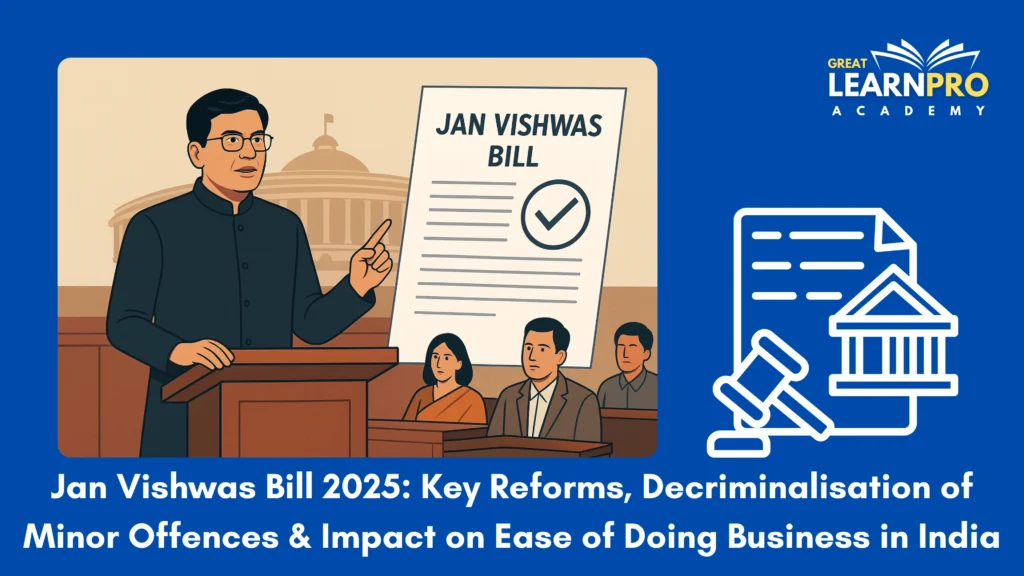
On August 18, 2025, Union Minister Piyush Goyal introduced the Jan Vishwas (Amendment of Provisions) Bill, 2025 in the Lok Sabha, marking a significant step in India’s reform of regulatory legal frameworks. The bill was swiftly referred to a Select Committee for detailed scrutiny, with its report expected by the first day of the next parliamentary session. This legislative push builds on the momentum from the Jan Vishwas Act, 2023, furthering the government’s pledge of “Minimum Government, Maximum Governance”.
Scale of Reform: What’s Being Changed?
- The Bill seeks to amend 355 provisions across 16 central Acts, administered by 10 ministries and departments.
- Of these, 288 provisions are to be decriminalised, effectively removing criminal penalties for minor technical and procedural defaults.
- Another 67 provisions are being amended to improve the ease of living, reflecting a larger focus on streamlined, citizen-friendly governance.
How It Works: Key Provisions of the Bill
Warning & Improvement Notices
For 76 offences under 10 Acts, first-time offenders will receive warnings or improvement notices instead of facing penalties. This includes areas such as using non-standard weights and measures.
Removing Jail for Petty Defaults
Imprisonment clauses for minor, technical infractions such as non-compliance under the Electricity Act, 2003 are replaced with monetary fines. For instance, a violation previously punishable by up to three months of jail now leads to fines only.
Graduated Penalties to Maintain Deterrence
The Bill introduces a mechanism to automatically increase fines by 10% every three years, ensuring penalties remain effective without constant legislative updates.
Administrative Adjudication
Designated officers will handle enforcement via administrative processes reducing reliance on the judicial system and helping ease court congestion.
Rationale & Broader Context
India’s legal system is under immense stress, with over 3.6 crore pending criminal cases, more than 2.3 crore of which are over a year old. Minor offences often flood courts, delaying justice for serious crimes. The Bill aims to restore balance by easing judicial burden, promoting trust-based governance, and removing fear of incarceration for petty violations.
The government argues that criminalising trivial infractions hinders entrepreneurship, innovation, investment, and GDP growth. Especially for MSMEs, the threat of criminal prosecution over technical lapses creates a culture of fear. The reform seeks to shift the paradigm to one of trust, correction, and compliance.
Real-World Implications
- Everyday infractions like honking in a silence zone, tying a cow to a pole, or non-critical recordkeeping errors would no longer be labelled criminal but managed through corrective notices or fines.
- Substantive improvements under laws like the Drugs and Cosmetics Act, 1940 and Central Silk Board Act, 1948 replace jail terms with monetary penalties upwards of ₹25,000, contingent on repeated violations.
- Institutionalising predictability in compliance costs via automatic fine adjustments enables better planning for businesses.
The Road Ahead: Benefits and Cautions
Positive Outcomes:
- Reduced Court Backlogs — More efficient justice delivery.
- Business-Friendly Environment — Lower legal risk improves confidence and investment.
- Regulatory Trust — Encourages voluntary compliance through non-punitive governance.
- Adaptive Penalties — Ensures deterrence without frequent legislative intervention.
Potential Concerns:
- Easing penalties may open the door to lax compliance or corruption, especially in implementation, unless oversight mechanisms are robust.
- The Bill deals only with criminal provisions; broader compliance burdens like excessive filings and procedural obligations remain largely unaddressed.
- State-level alignment is essential. While states like Madhya Pradesh have passed their own Jan Vishwas–style reforms, uniform implementation remains a challenge.
Conclusion
The Jan Vishwas Bill, 2025 represents a bold reimagination of Indian regulatory philosophy prioritising trust over punishment and efficiency over rigidity. By decriminalising minor offences, introducing graded penalties, and decentralising enforcement, it promises to significantly ease both business operations and citizen interactions with law.
However, translating legislative intent into real-world impact demands close oversight, transparent implementation, and expansion beyond mere decriminalisation. If effectively administered, this Bill could be a milestone in India’s journey toward a more agile and humane governance framework.
Sources:
- https://timesofindia.indiatimes.com/india/jan-vishwas-bill-introduced-in-ls-sent-to-panel/articleshow/123377181.cms?utm_
- https://economictimes.indiatimes.com/news/politics-and-nation/govt-introduces-jan-vishwas-iim-amendment-bills-amid-opposition-protests-in-parliament/articleshow/123372165.cms?utm_
- https://www.newindianexpress.com/business/2025/Aug/27/ease-of-doing-business-or-ease-of-offending-the-jan-vishwas-dilemma?utm_
More Current affairs: https://learnproacademy.in/updates/
